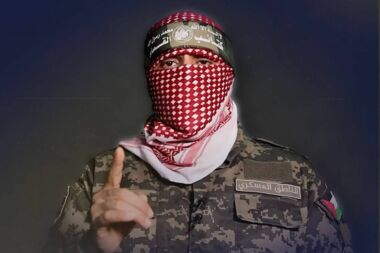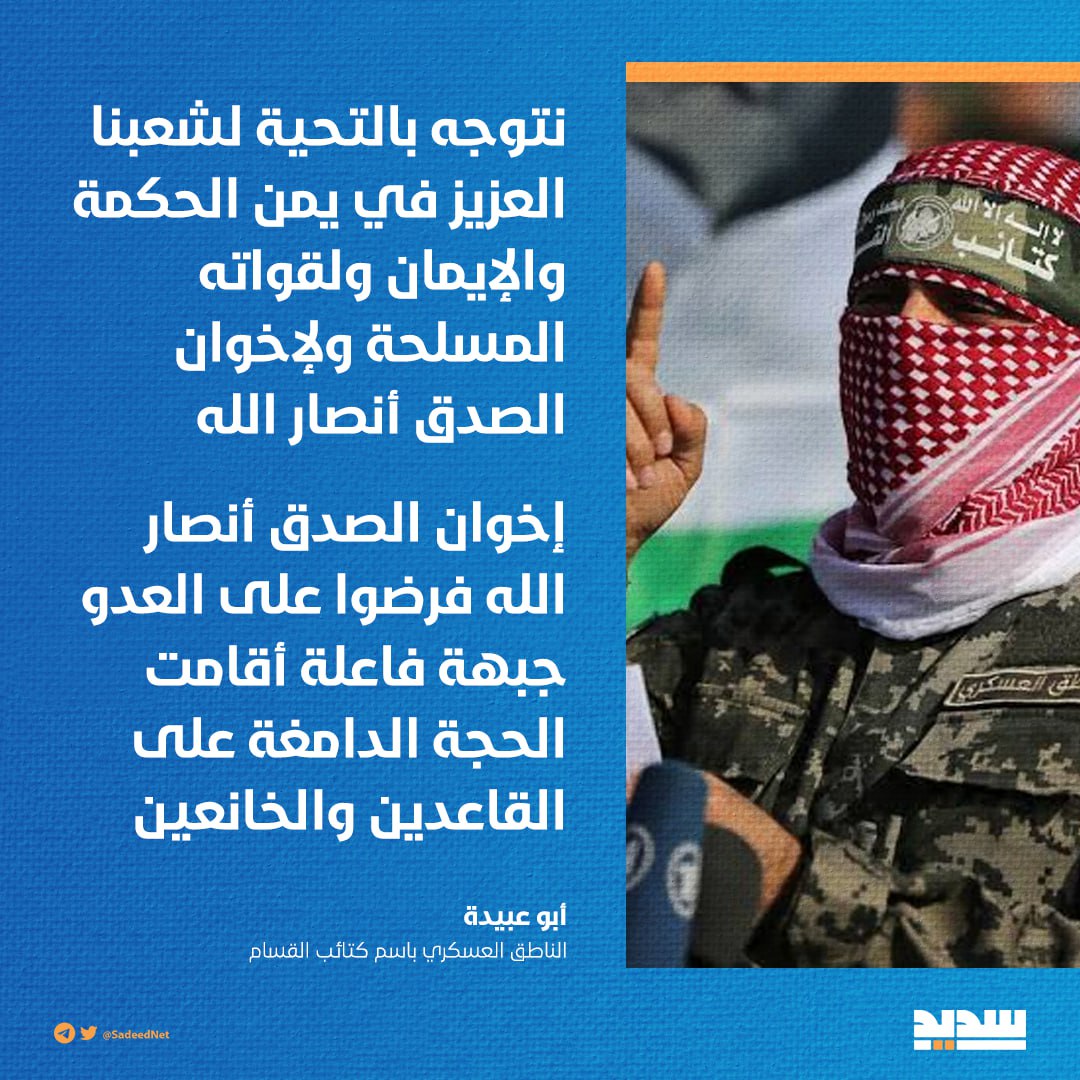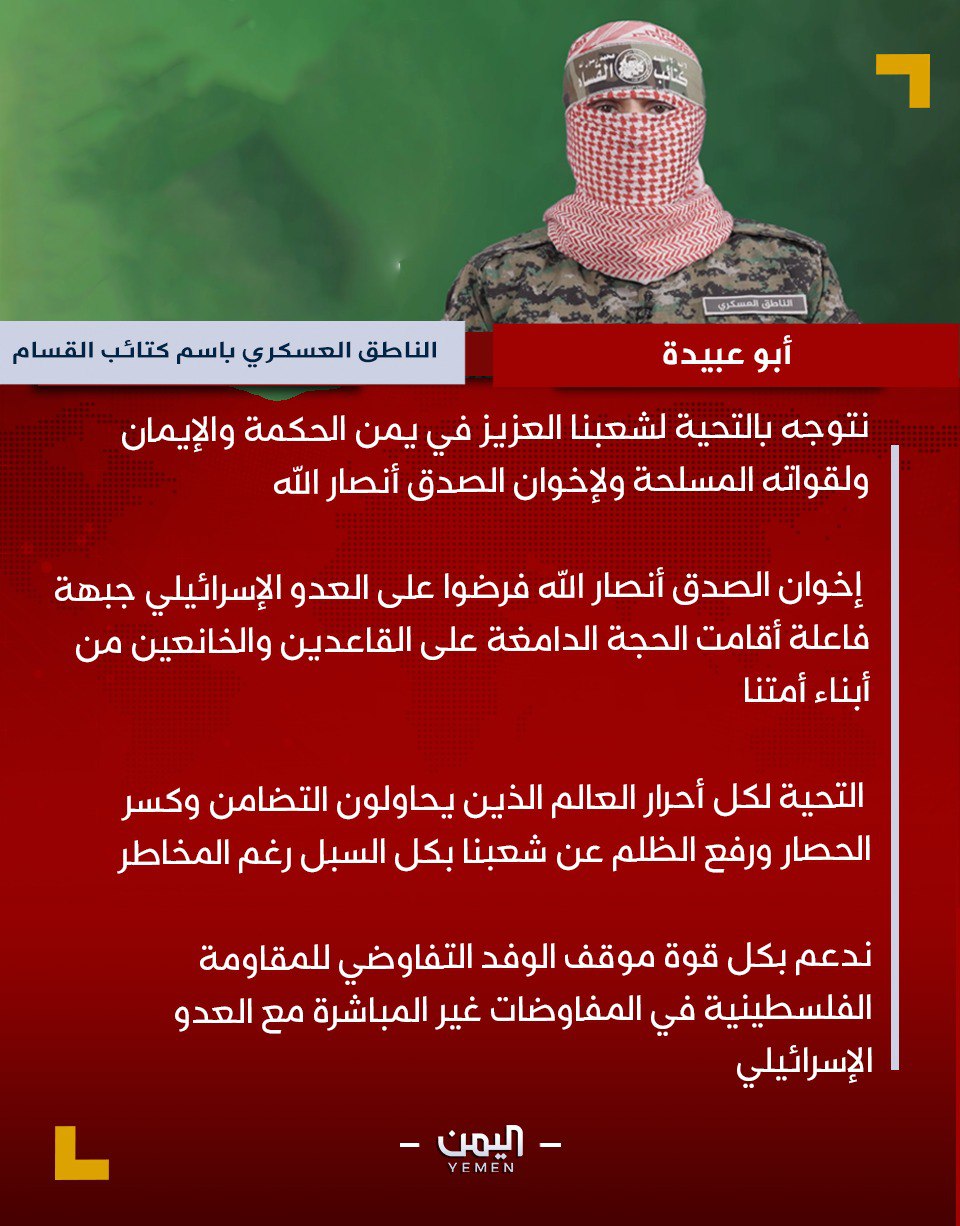
Sana’a – SABA: Jameel Al-Qashm
In his televised address Friday evening, Abu Ubaida, the military spokesperson for Al-Qassam Brigades, delivered a forceful and revealing argument on the Arab and Islamic stance toward Gaza—combining candidness, reproach, and accountability. His message pushed beyond media rhetoric and into the realm of practical impact and decisive positioning.
The speech marked a noticeable shift in the tone of the resistance. Abu Ubaida anchored evaluation criteria on real-world outcomes—specifically, how a stance translates into tangible field support during times of siege and catastrophe.
Yemen’s inclusion in the message wasn’t symbolic—it was deliberate. It reinforced its role, honored its frontline position, and acknowledged its consistent, disciplined political and military contribution, uninfluenced by external pressures or deviation.
Abu Ubaida’s salute to Yemen and its armed forces reflected the high regard in which Sana’a is held within the resistance. It signaled that Yemen has become a trusted and integral part of the axis shaping the balance of deterrence and expanding the front of confrontation against the Zionist entity.
The statement also delivered a sharp indictment of the responsibilities borne by state leaders, political parties, religious scholars, and elites—holding them accountable for the massacres, starvation, and displacement suffered by the people of Gaza. Abu Ubaida linked moral obligation directly to action: failure to act equals dereliction of duty.
This wasn’t a symbolic address; it was a battlefield audit. Yemen emerged as a model of active solidarity—delivering coherent performance, independent decision-making, and a strategic vision aligned with the nature and duration of the struggle.
The speech’s tone around the bloodshed and civilian suffering was one of open moral accounting: each delay deepens the wound, and each hesitation multiplies the cost. It redefined the relationship between cause and position—no more abstractions, only impact.
Yemen, in this narrative, is a position fortified by trust, earned through continuous action since the beginning of the aggression—whether through naval operations or clear, unwavering political rhetoric. Its stance has been marked by consistency and strategic clarity.
Abu Ubaida’s expression of sorrow from Gaza revealed the emotional weight of a front line advancing without adequate support, burdened doubly with combat and isolation. His words conveyed the voice of a commander speaking on behalf of a city exhausted by both battle and abandonment—fighting two wars at once: one of fire, one of solitude.
The pain in Abu Ubaida’s voice felt deeper than that of the battlefield—he spoke as a man alone in bearing the responsibility for bloodshed. He surveyed the shattered landscape for signs of support, only to find silence from the capitals. Gaza, meanwhile, stretched its frontline from home to home, tunnel to cry, fighter to martyr—under an Arab roof that offered no unified trench.
The message pointed to the fatigue of arenas left unsupported and to the strain of the lone hand that stays on the trigger without relief. His framing cast the Palestinian front as a stern test of the region—recording who truly stands firm in each round, and who falters when it matters. The tone was resolute: the brigades fight with unshakable faith and conviction, and the coming days won’t wait for the hesitant.
Yemen’s mention in this context aligns with the logic of anchoring partnerships. Resistance networks are built on accumulative action and battlefield credibility, not media posturing. Presence matters—what you do, not what you say.
Abu Ubaida’s words reset the compass, pointing squarely toward forces that create real change and uphold resistance as a core principle of the phase. Yemen’s performance and position—across sea, sovereignty, and decision-making—embody this approach.
The speech, as a whole, read like a historical reckoning—assigning every actor their rightful place, cementing the idea that partnerships in war are earned through field performance, measured by blood and bold decisions.
In this moment, the reference to Yemen underscores the peak of a sustained political and military trajectory—one that began early, held steady, and now positions Sana’a as a central player in shaping pressure on the enemy.


